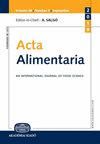利用功能性发酵剂生产发酵饮料用乳清
IF 1
4区 农林科学
Q4 FOOD SCIENCE & TECHNOLOGY
引用次数: 1
摘要
筛选了用于生产乳清饮料的本土酵母菌株马氏克卢维菌(MH6)、马氏K.酵母(CH1)和酿酒酵母(C1)。马氏K. marxianus (MH6)的发酵效率显著高于其他酵母菌(P < 0.05)(15.2%)。乳清发酵的最佳条件为16白利度,pH 5.5, 28°C, 72 h不搅拌。为了发酵乳清饮料的生产,水果,即金诺(Daizy),番石榴(Allahabad safeda)和芒果(safeda)与乳清以不同的比例混合,即80:20,70:30,60:40和50:50。各配比在生化和感官分析上差异均显著(P < 0.05),其中乳清蛋白、乳清芒果和乳清番石榴的配比分别为60:40、70:30和60:40。为了提高乳清饮料的风味,添加了调味剂(肉桂、豆蔻、茴香籽和苹果香精)。评审团对所有乳清饮料进行了快乐评分,豆蔻乳清番石榴饮料获得了8.16分的最高分。乳清饮料经巴氏杀菌后冷藏保存,保质期评估为15天。该研究表明,马氏乳杆菌具有生产发酵乳清果混合饮料的潜力,这些饮料可以替代合成瓶装水果饮料,成为一种健康清爽的替代品。本文章由计算机程序翻译,如有差异,请以英文原文为准。
Valorisation of whey for fermented beverage production using functional starter yeast
Indigenous yeast strains Kluyveromyces marxianus (MH6), K. marxianus (CH1), and Saccharomyces cerevisiae (C1) were screened for whey beverage production. K. marxianus (MH6) showed significantly higher (P < 0.05) fermentation efficiency (15.2%) as compare to other yeast strains. The conditions optimised for whey fermentation were 16 Brix, pH 5.5, 28 °C, and 72 h without agitation. For fermented whey beverage production, fruits viz., kinnow (Daizy), guava (Allahabad safeda), and mango (Safeda) were blended with whey at different ratios viz., 80:20, 70:30, 60:40, and 50:50. All ratios showed significant differences for biochemical and sensory analysis (P < 0.05), out of which ratios 60:40, 70:30, and 60:40 for whey kinnow, whey mango, and whey guava, respectively, were selected. To enhance the flavour of whey beverage, flavouring agents (cinnamon, cardamom, fennel seeds, and apple essence) were added. A panel of judges assessed all whey beverages on a hedonic scale basis, and cardamom whey guava beverage received the highest score of 8.16. The whey beverages were stored under refrigerated conditions after pasteurisation, and the shelf life was assessed to be 15 days. This study conferred that K. marxianus held the potential for fermented whey fruit blend beverages production and these beverages could be an alternative healthy refreshing substitute for synthetic bottled fruit beverages.
求助全文
通过发布文献求助,成功后即可免费获取论文全文。
去求助
来源期刊

Acta Alimentaria
农林科学-食品科技
CiteScore
1.80
自引率
0.00%
发文量
47
审稿时长
18-36 weeks
期刊介绍:
Acta Alimentaria publishes original papers and reviews on food science (physics, physical chemistry, chemistry, analysis, biology, microbiology, enzymology, engineering, instrumentation, automation and economics of foods, food production and food technology, food quality, post-harvest treatments, food safety and nutrition).
 求助内容:
求助内容: 应助结果提醒方式:
应助结果提醒方式:


